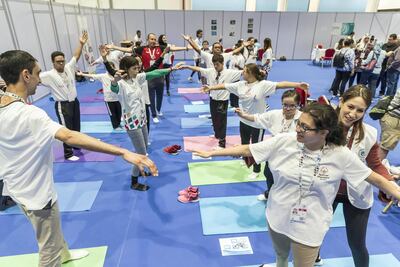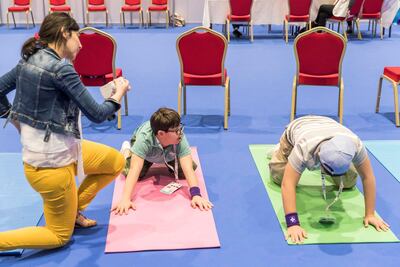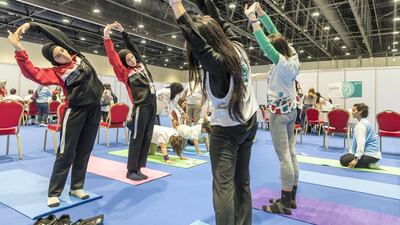Deep breathing and yoga techniques are being taught in the Special Olympics games to help people with intellectual disabilities manage stress and pressure both on and off the playing field.
The Strong Minds project has been rolled out during the MENA Games as part of Healthy Athletes, the largest health programme in the world for people with developmental disabilities.
A pilot Strong Minds project was introduced during the games in Winter World Games in Austria last year.
Wide ranging coping techniques to handle tension and anxiety will be explained to visitors at the Adnec arena in Abu Dhabi throughout the week.
Free screening such as dentistry, sight and hearing checks are provided for 1,500 people with intellectual disabilities as part of the programme.
The aim is to continue the integrated stress and health check-ups through to the World Games in the UAE in March next year.
“All of us get stressed at different points of our life. Competing, as great as it is, can be stressful. We teach deep yoga breathing and stretching techniques that help with stress relief. This can be done whether a person is in a wheelchair, lying down or sitting on a chair, any position that is comfortable for them,” said Nadia Sehweil, co-founder of Bodytree Studio.
The Abu Dhabi based yoga and pilates studio is working with the Special Olympics Healthy Athletes programme on the mental and emotional wellbeing of people with intellectual disabilities to help them use yoga to relax, and release physical and mental tension.
“Things like yoga meditation and mindfulness can become a lifestyle, it can be integrated into their lives. We can adapt techniques so if a person has a sinus problem, we adapt breathing techniques or if a person is uncomfortable lying down, we do exercises sitting up. The purpose is to find a modification,” she said.
“These athletes are just so happy. It is really a humbling experience for us to work with them.”

Similar modifications are used by yoga instructors when people have knee or back problems.
Trainers are on hand to help athletes through the Strong Minds stations located within the Healthy Athletes arena. Different zones have been set up to help athletes, their care givers and parents understand how to manage stress.
Identifying how various muscles tense up along with release is taught alongside relaxation and stretching exercises so the athletes can handle situations from anxiety on the field, at home, school or even at the airport.
“These principles apply for everyone. There are muscles that feel achy when you are stressed and it helps to recognise what happens when you let go,” said Dr Khaled Kadry, senior consultant child and adolescent psychiatrist from Maudsley Health, which has teamed up with Bodytree for the Strong Minds programme.
“There is music they can listen to or a strong message from parents or friends that they can remember to help them. And they leave with a summary of what they can do the next time they feel stressed like remembering to breathe, doing a bit of stretching or remembering their mother is here for them.”
Cognitive disabilities have a range from mild and moderate to profound. Doctors said the project was key to identifying signs of anxiety since many people with intellectual disabilities may not be able to communicate what they are experiencing.
“We shouldn’t be surprised that they develop anxiety, stress or depression. In fact, they may be more vulnerable. You and I can communicate if we are sad, upset or stressed but if a person has a developmental delay, speech may not be [their] easiest form of communication,” Dr Kadry said.
______________
Read more:
Abu Dhabi welcomes Special Olympics athletes to 'the willpower nation'
The Special Olympics are testament to the UAE's inclusivity for people like me
UAE sprinters challenge perception that Arabs don’t play sport
______________
“Then it’s important for those individuals who are caring for them to read and watch out for the signs and get to know these better. This is sometimes overlooked because they don’t describe it, but it can be present in certain behaviours. With these tools, carers, family members and the public can be more aware that people with intellectual disabilities may also suffer from stress but may not easily convey it.”
This will continue as part of the legacy programme after the MENA games with training on coping mechanisms imparted to others, including parents, doctors, nurses, yoga instructors, physiotherapists, occupational therapists, counsellors, psychology trainees and university students.

“Yoga releases tension and also strengthens. It is about teaching them to understand and be conscious of their body and how to move in a safe, stable manner,” Ms Sehweil said.
“These is something they can take with them and use in everyday life. It helps make a mind and body connection.
“Parents can work on this at home with children. It is beneficial when parents take it on because children model their behaviour on their parents, so if we mediate our children are more likely to follow. We strongly encourage parents to be the drivers for change.”


